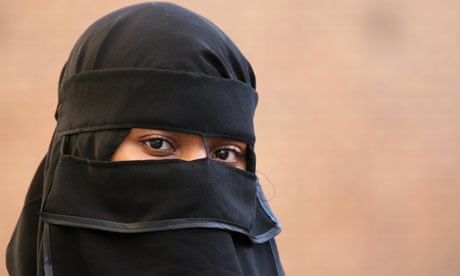A Muslim woman has been allowed to make a plea in court while wearing a face-covering niqab after a judge agreed a compromise in which she was identified in private by a female police officer who then attested to her identity.
The judge in the case at Blackfriars crown court in London then heard arguments as to whether the woman, who cannot be named for legal reasons, should be allowed to wear the niqab, which leaves only her eyes showing, during her full trial. Judge Peter Murphy will give that decision on Monday.
The compromise follows a standoff when the woman, who is charged with witness intimidation, first appeared before Murphy in August. Then, he ordered her to remove the face covering, saying the requirement for her to be properly identified as the defendant overrode her religious beliefs. She refused, saying she did not want to uncover her face when there were men in the room, and the case was adjourned.
On Thursday he allowed her to plead not guilty in the dock wearing the niqab after a female police officer who saw the defendant's face when her custody photograph was taken witnessed her with the veil removed in a private room. The officer then swore on oath that the correct person was in court.
The woman's barrister, Susan Meek, said she was entitled to wear the niqab under the section of the European convention on human rights relating to religious beliefs.
"She is entitled to wear it in private and in public," Meek said. "That right to wear the niqab also extends to the courtroom. There is no legislation in the UK in respect of the wearing of the niqab. There is no law in this country banning it."
The court heard details from a similar case which reached Canada's supreme court last year after a judge ruled that a woman should remove her niqab when testifying in a sexual assault case so jurors could properly gauge her credibility as a witness. The supreme court eventually ruled such decisions should be made on a case-by-case basis.
Meek argued that a jury would be able to assess the defendant from her answers and body language. She said: "Ultimately it's the choice of the defendant if she wishes to wear it.
"If she chooses to remain with her face veil on when giving evidence that is something she will no doubt be spoken to about by the judge in front of the jury.
"To ask her to remove it, if that is the court's opinion at the end of it, what consequences follow? A court order and proceedings of contempt? Is that right and fair?"
